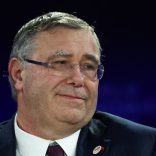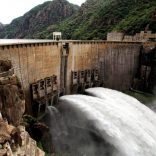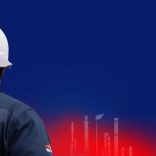Kenmare Resources urges decision on Mozambique rights renewal
Young Mozambican engineers eager to prove themselves in new Rovuma gas era

Photo: Lusa
Carduel Bila, 33, a chemical engineer and graduate of Eduardo Mondlane University in Maputo, is scheduled to work on the Coral Sul platform, which today started its trip from the shipyards in South Korea towards Mozambique.
He says he has the feeling of “being a pioneer”, and also of “carrying some responsibility” as a result of being among “the first in this industry” in the country.
“Responsible for demonstrating that we Mozambicans have the capacity, we learn fast and are capable of ensuring the processing of liquefied natural gas in the near future,” he told Lusa.
Carduel was speaking on the sidelines of the official launch ceremony of the floating platform that will initialise the era of Rovuma basin gas exploration off the coast of Cabo Delgado, ranked among the largest reserves in the world.
The start of exploitation is the first step towards placing Mozambique among the world’s largest producers of liquefied natural gas.
The infrastructure goes into operation from 2022, with around 270 people on board and others in offices in Maputo and Pemba, most of them from other countries, due to the lack of specialised technicians in Mozambique.
But oil major Eni, which leads the consortium’s Area 4 LNG project, intends to prioritize Mozambican labour, considering it an advantages for the country, creating jobs and opportunities, and for the accounts of the oil company, given the high costs of retaining personnel from abroad.
In addition to work in the shipyards, a long-term training program is currently underway for 204 Mozambicans in the oil and gas sector, 48 of whom are already part of the Coral Sul project teams.
The strategy also includes training teachers and other professionals, and envisions reaching 800 people over the 15 years of operation, with multiplier effects.
“The process is gradual,” observes Gilberto Semente, 35, another Eni graduate in South Korea undergoing preparation arranged by the oil major which has, over several months, taken candidates to different oil and gas projects around the world, giving them specialist industry knowledge.
“In a few years they won’t be talking to me, but to others. Maybe we will reach a level where they will no longer see foreign faces, they will only see Mozambicans,” in this type of project, says Gilberto.
Like Carduel, a chemical engineering graduate from Mozambique who sees in the Coral Sul project the fulfillment of “a dream” of “being able to transform raw materials into useful products”, when he finishes his training in April, 2022, and returns home to work on the platform.
Area 4 is operated by Mozambique Rovuma Venture (MRV), a joint venture jointly owned by ExxonMobil, Eni and CNPC (China), which holds a 70% stake in the concession contract.
Galp, KOGAS (South Korea) and Empresa Nacional de Hidrocarbonetos (Mozambique) each hold a 10% stake.













Leave a Reply
Be the First to Comment!
You must be logged in to post a comment.
You must be logged in to post a comment.